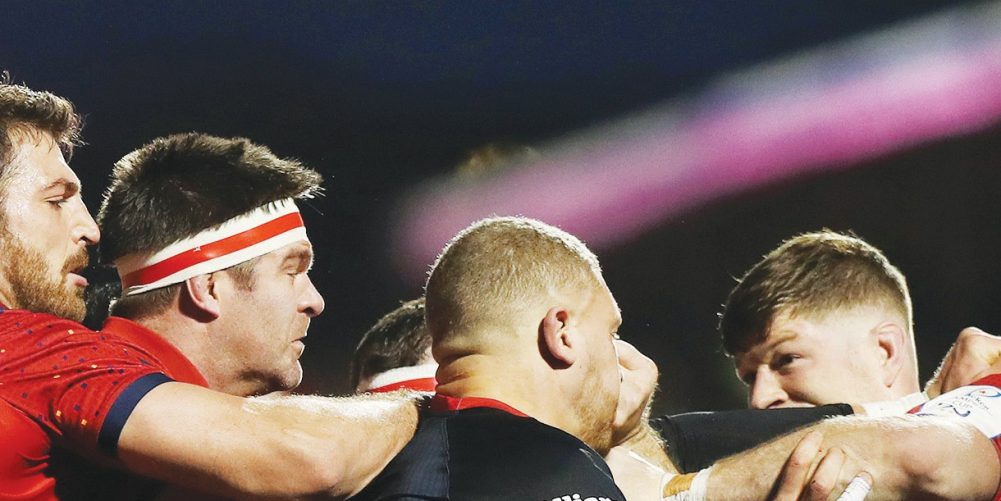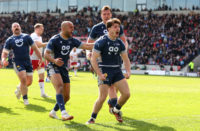
A FRONT ROW VIEW OF THE GAME
There's nothing like a good old fashioned punch-up or handbag waving contest to get the emotions running high – and an over reaction by the players in both teams.
Saracens against Munster was always going to be an intense ‘in your face' game with two of the former European champions hoping to reach the finals crashing into each other in this vital game for who qualifies in the Pool.
Normally, you would expect it to take an illegal physical act like gouging, biting or punching to spark the sort of reaction seen at Alliance Park, especially as it brought virtually both complete teams into the fracas – but this time it seems to have been a few nasty comments. While it is true that some verbal insults can prompt a violent reaction from the person they are leveled at, they usually don't get a collective retaliation by the whole team, making this incident quite unusual.
If true, it was just a throwaway insult by Munster's Dr Jamie Kearns directed at Jamie George for kicking a ball at a Munster player that sparked the incident. It would seem that either tensions within the Saracens camp are far higher than we are led to believe, or that George has had a change in character.
As an established player, I am sure Jamie has had more than his fair share of insults hurled at him from oppositions and spectators, and yet this is the first time he has reacted in such a way.
He is now the first choice hooker for England, and has played in a number of internationals where it is almost a given that at some point you are going to be insulted, and have your character, personality, body image, parents, anything and everything assassinated.
I always thought that if my opposition started to insult me, even before a game, that I was creating problems for them and they were looking for excuses. Although I had the odd altercation, usually at the scrum, I can never remember the whole team getting involved, the rest of the pack yes, but not the backs.
It could be that George, having reacted, the rest of the team got involved so that he wasn't singled out for punishment in the fashion of the famous 1974 Lions ‘99' call. Where, if one player reacted to an act of foul play, the whole team hit their nearest opponent.
The ‘99'call was born out of the days when there weren't neutral referees and the home team, South Africa in this case, could get away with physically assaulting individual players without punishment from the referee.
However, if the assaulted player were to retaliate, he was immediately penalised or sent off, so something had to be done to protect the individual members of the team.
It was the players, in particular captain Willie-John McBride, who came up with the idea of a call that would bring the team together in a collective act of retribution if just one was assaulted in the knowledge the referee could not send them all off.
”George has now lined himself up for endless sledging from opposition players”
In George's case, a pushing match ensued with probably a few insults handed out by all involved. Meaning that if proven, Dr Kearns will face some form of punishment from either Munster or ERC.
However, that won't be the end of it because having reacted as he did, George has now lined himself up for an endless amount of sledging from opposition players who will attempt to put him off his game or concede penalties with all sorts of comments in the hope he will react again!
Brendan Gallagher's article last week highlighted the problem of the continual collapsing of the scrum and the annoying breaks this causes throughout the game, and to a certain degree he is right. If you watch any of the old games from the 70's through the 90's and into early 2000's you don't see the sort of delays that we now have with the scrums continually falling down.
Even though the clock is stopped for some of the resets, the impact on the enjoyment of the game for the players and spectators is damaged by these interminable stoppages. The big question is: what are the reasons this has slowly been allowed to become the norm?
The obvious answer is that allowing the referee to take charge of the engagement has disrupted the timing of both packs and put players in the wrong position to effectively keep the scrum up.
We all know that referees were forced to take charge by World Rugby to reduce the risk of potential injury, which has to a certain degree worked.
This has also created a situation where, if the scrum collapses on engagement, the referee shares some of the responsibility and therefore has to allow the scrum to reform.
Then there is the fact that as the scrum has slowly been de-powered and lost importance over the last few years, coaches have tended to pick players who do not have the ‘right' physique (or mentality) to play in the front row, but have other attributes around the field.

The physics of a scrum are complex and rely on a balance that allows for transmission of power along and through straight lines.
If props are too tall or have long backs, they are more likely to be incorrectly bending over when the scrum is engaging.
The short bind that referees prefer before the engage call creates a tipping motion as the pressure comes through thereby obviously causing a collapse.
The scrum will hopefully regain its importance over time, because as South Africa have shown, get it right and you can achieve domination and win important games.



























